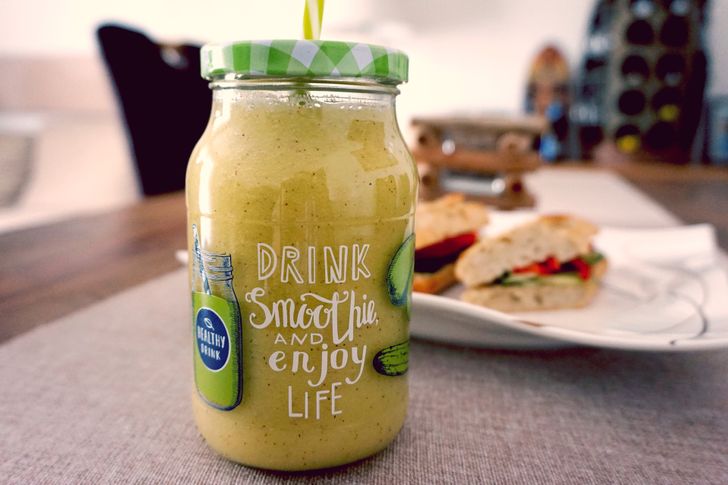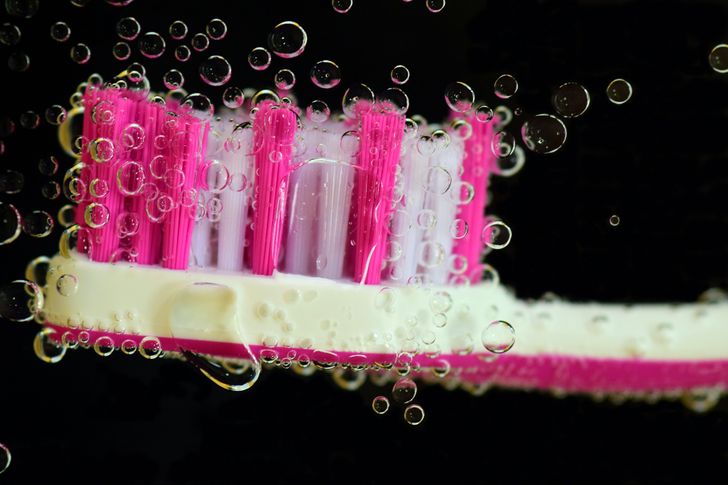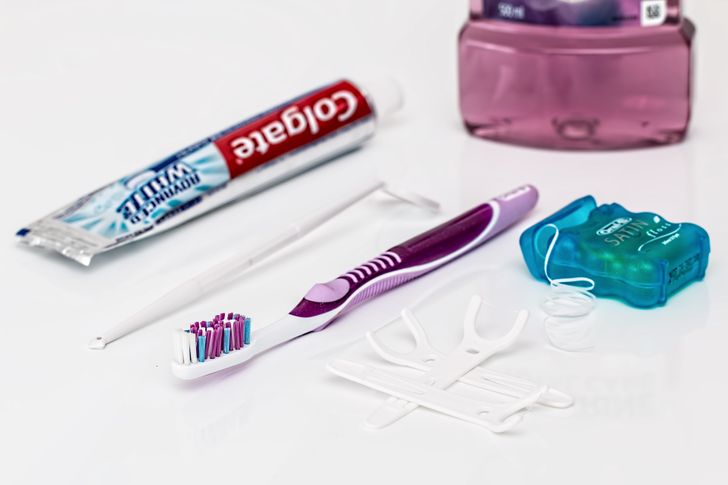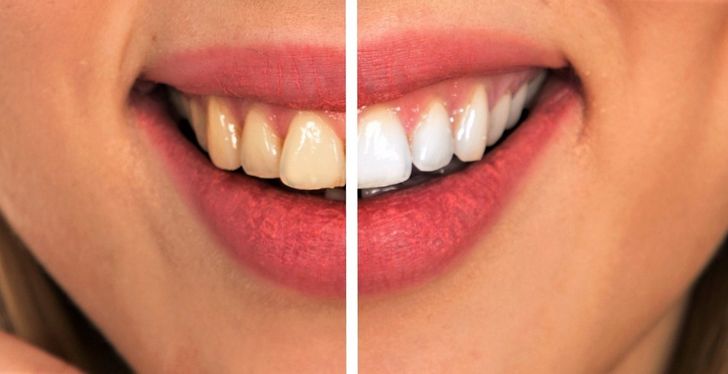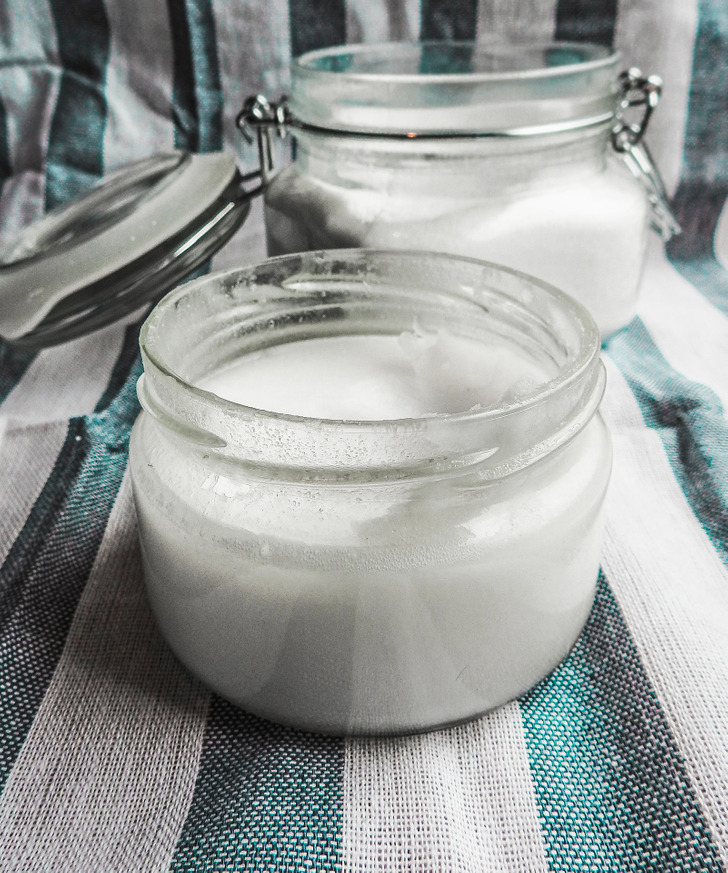These rips were very helpful, but I really wish I wasn't allergic to coconut oil so I could try the whole make your own toothpaste thing.
8 Amazingly Simple Things You Can Do to Prevent Cavities — Bright Side
We’ve all been told to brush and floss to avoid tooth decay. However, tooth decay is a very common problem. Here are 8 simple things from our article that you can do to prevent tooth decay — Bright Side
1. Change your eating habits.
Changing your eating habits and switching to a healthy diet always help boost your health, no matter what your goal is. A study published in The British Medical Journal suggested that a change in diet can actually prevent or reverse tooth decay, depending on the stage it currently is. We already know that the consumption of products rich in sugar leads to tooth decay. However, if you change your eating habits, you may never face such a problem.
- Get more calcium. It’s the main building component of your bones and teeth. Consume dairy products every day (milk, yogurt, sour cream, and cheese).
- Drink unsweetened beverages. Avoid drinking soda, juice, and fizzy drinks. You can try simple water, fruit smoothies, and unsweetened tea. Water has a lot of good effects on your body, including increased hydration and a higher flow of saliva.
2. Chew sugarless gum.
It might sound ironic, but chewing sugar-free gum can actually help you prevent tooth decay. When you chew, your mouth fills with saliva that can naturally wash off food remains, neutralize acids, strengthen tooth enamel, and fight diseases.
It can also help make your enamel stronger because when you chew gum, you are adding more calcium and phosphate into your mouth. Not only can it fight your cavities, but it can also get rid of the acid in your mouth from food and drinks. If you take medications that make your mouth dry, sugar-free gum is even better to help resolve this issue.
3. Clean and change your toothbrush regularly.
What’s the most important tool that we use to clean our teeth? Right! A toothbrush. However, few people know how important it is to choose the right toothbrush.
- Always pick a small or a medium-sized brush, and make sure that its bristles can reach into the crevices of your molars where food remains can hide after you eat.
- Don’t use covers for your toothbrush because they may harbor microorganisms and bacteria. Instead, just rinse your brush with water after each use, and leave it to air dry. And don’t leave your brush in the same room as your toilet since fecal bacteria can end up on it.
- Change your toothbrush regularly because its bristles deteriorate with time and use. As a result, you don’t clean your teeth as well as with a new toothbrush.
4. Follow a basic dental care routine.
It might sound like overfamiliar advice, but it really works. According to researchers, 58% of people don’t floss at all and 38.1% have never used mouthwash. Sometimes we don’t realize that our dental care isn’t right or that it requires changes. If you want to protect your teeth from early decay, include the following steps in your dental care routine in the morning and before going to bed.
- Brush your teeth for 2 minutes twice a day. Try to brush all the surfaces of your teeth, reaching out to the farthest corners.
- Floss your teeth. Sometimes even brushing doesn’t work as well as flossing. Use floss to pull out any remaining food from underneath your gums, and try to get to the germs that are stuck there.
- Use mouthwash. Any mouthwash has an antibacterial effect and helps you get rid of any remaining bacteria in your mouth. Don’t rinse your mouth with water — the effect will last longer.
5. Visit your dentist for regular cleanings.
We know that regular visits to the dentist are not the most pleasant, but it’s always better to prevent a problem than to treat it. No matter how well you brush or floss your teeth, there will always be areas that are hard to reach.
A dentist will clean near the gum line on the back and front of your teeth to remove any plaque and tartar. Regular cleaning is a very important step in the fight against cavities. Many people say that they enjoy cleanings and the lovely smooth feel of their teeth afterward. Make sure that you book an appointment at least once a year.
If you have deeper issues with cavities, then your doctor may use X-ray machines and lasers to check out your teeth. They also wear masks and gloves to prevent the spread of bacteria and germs.
6. Add supplements and vitamins to your diet.
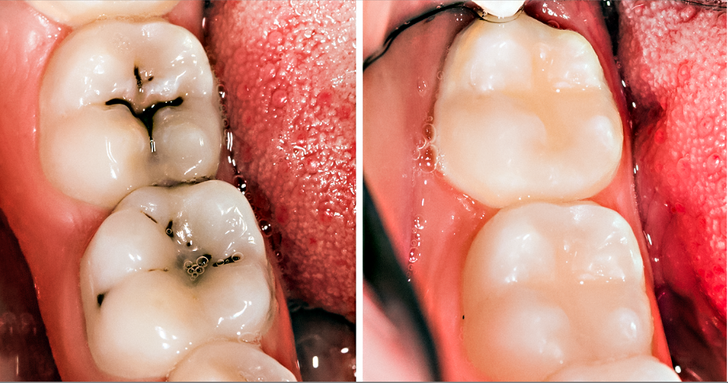
We’ve already discussed eliminating sweets and candy from your diet, but there’s one more thing you can do to help your saliva fight dental plaque. Vitamins are essential for establishing the good health of your teeth.
Sugar is very bad for your teeth when it comes to plaque, so eating sweet and sticky foods, such as jelly, isn’t the best option for healthy teeth. Every time you eat sugar, your teeth are in danger for the next 20 minutes, so try brushing your teeth after eating sweets. Your cavities will gradually go away.
- Eat whole-grain foods. They contain a lot of vitamin B and iron. In addition, whole grains contain magnesium, a mineral that helps absorb calcium and strengthen your teeth.
- Eat seafood more often if you want to get more vitamin D from your meals. Salmon, herring, tuna, and mackerel are great sources of vitamin D.
7. Try coconut oil pulling.
Coconut oil has a variety of health benefits for many parts of the body. When it comes to your teeth, you can try coconut oil pulling to naturally protect your teeth from decay. The oil pulls bacteria out of your teeth and naturally heals them. Simply swish a tablespoon of coconut oil in your mouth for 20 minutes. Don’t swallow it. It’s so simple yet so effective, plus it has health benefits!
Oil pulling does not reverse the effects of tooth decay, but it can prevent cavities. By the way, it’s twice as effective if you do it in addition to brushing and flossing.
8. Make your own remineralizing toothpaste.
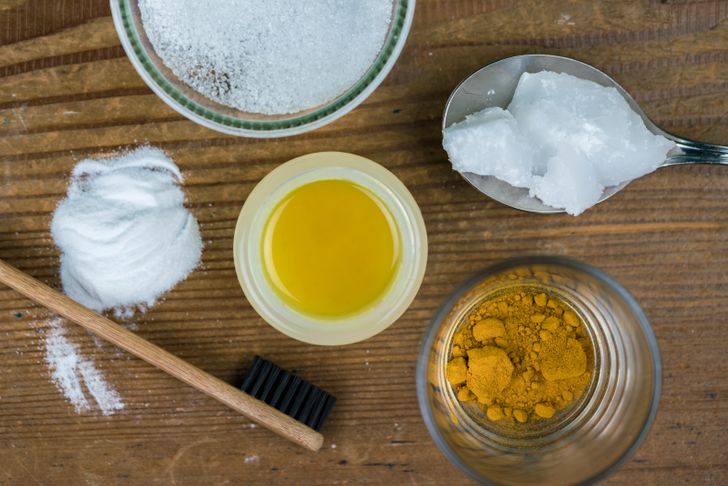
This simple toothpaste recipe requires only a few natural ingredients that you can buy in any store. Since you make it yourself, you can be sure that all the components are natural and won’t harm your health. You’ll need the following ingredients to make the toothpaste:
- 2 tbsp of calcium powder: Adding calcium carbonate can help your teeth heal and add minerals to it, making the cavities go away.
- 1/2 tsp of liquid stevia
- 1 tbsp of salt
- 1/2 cup of baking soda
- 1/2 cup of coconut oil: Coconut oil has many antibacterial components that can rid the mouth of impurities and cavities. You may also want to try swishing this toothpaste for a couple of minutes before spitting it out to get more benefits.
- 1 tbsp of peppermint flavor
Mix all the ingredients until you get a paste. It should be even with no crumbs. Use it as a substitute for your regular toothpaste.
Do you follow any of the rules listed above? Or do you prefer professional dental treatment? Do you know any other tricks that might help prevent teeth decay? Share your ideas and experience in the comments.
Comments
I will try these out but about the changing food hack I just wanna say like what foods should I eat?eg.should I eat eggs,fruits,meat,veggies,vitamin c,d,e,k etc
Ok so I tried some toothpaste and it got rid of some stains ,yes I just realised they were stains
so helpful information , enough detail that we can benefit from 🤍
You can also brush your teeth with neem stems. Though it tastes so much bitter in taste it will do good. And reverse the decays.. but you need to start at first.
Also use cloves for instant relief when you have a tooth ache.. just put it under the tooth which causing the pain..it will reduce the pain. Also brush teeth with ash to get super shiney and white teeth.these are followed by many Indians till now.
